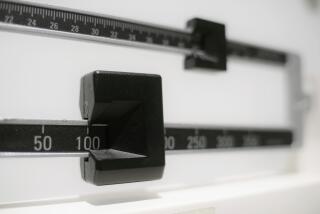Advice to Bingers: Eat Early and Often
- Share via
It’s a familiar lament: “I don’t eat breakfast, I eat a light lunch and I still can’t lose weight.” Many of these meal skippers, however, bolt to the refrigerator the minute they get home from work and don’t stop eating until bedtime.
No wonder. It only makes sense that fasting during the day would lead to bingeing at night. Take the case of Mike Liberato, president of a packaging and shipping firm in Alexandria, Va. He never ate breakfast, grabbed a quick lunch if he remembered to, and when he got home, “I’d be starving to death. I’d chow down anything and everything.” Then he’d eat a full dinner, followed by a snack about an hour later.
Since Liberato starting seeing Virginia Inglese, a dietitian, he has started eating three small meals a day plus two snacks in between--and has lost 17 pounds. Liberato says he typically eats a bowl of cereal and milk for breakfast, a few graham crackers between breakfast and lunch, pasta for lunch, some more graham crackers or a piece of fruit in the mid-afternoon and then a sensible dinner.
“I don’t feel like pigging out,” he says, adding that his new eating pattern has made him feel more energetic.
Inglese says almost 80% of the clients she sees for weight control don’t eat breakfast, and many don’t eat lunch either. Not only are they famished by dinnertime, but eating is the way they relax from the stresses of work. Instead, Inglese encourages small, frequent meals--a routine she says has the added benefit of stabilizing blood sugar levels--plus unwinding at the end of the day by taking a walk or listening to music.
Dietitian Katherine Tallmadge agrees. “For most overweight people, skipping meals or eating in an unplanned sporadic fashion during the day is a frequent occurrence and contributes significantly to weight problems.”
In fact, the habit of skipping the day’s earlier meals is probably established in childhood. Almost 60% of fourth- through eighth-graders admit they don’t eat breakfast, says a recent survey by the American Dietetic Assn. and the International Food Information Council. And more than 40% said they don’t eat lunch. By contrast, only 17% indicated they skipped dinner.
Not feeling hunger until later in the day, a common complaint among breakfast skippers, is usually a result of eating late at night, Tallmadge says. To break that cycle, Tallmadge advises them to skip dinner for one night.
People who start eating breakfast may complain they feel hungrier the rest of the day, Tallmadge says. But when people eat breakfast and get hungry three hours later, “that’s just normal,” she says. It’s when people don’t eat breakfast that they distort their hunger signals and binge in the evening.
More to Read
Sign up for The Wild
We’ll help you find the best places to hike, bike and run, as well as the perfect silent spots for meditation and yoga.
You may occasionally receive promotional content from the Los Angeles Times.






